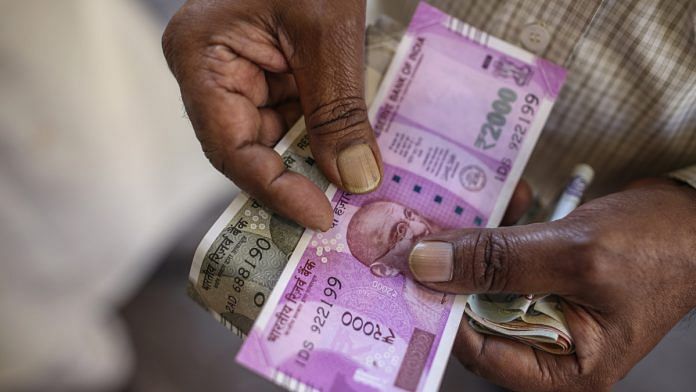New Delhi: The goods and services tax (GST) introduced by the Narendra Modi government in 2017 dealt a “big blow” to municipal finances, a study commissioned by the Fifteenth Finance Commission has said.
Based on data procured from 37 of the 53 municipal corporations with a population of over 1 million, the study carried out by the Indian Council for Research on International Economic Relations (ICRIER) found that the total municipal revenue declined as per cent of GDP from 0.49 per cent in 2012-13 to 0.45 per cent in 2017-18.
This is the latest period for which municipalities provided the data.
Besides, the ability of municipalities to raise their own source of revenue, as per cent of GDP, has also taken a hit — declining from 0.33 per cent in 2012-13 to 0.23 per cent in 2017-18.
“…abolition of octroi and other local taxes with the onset of GST was the most important factor for deterioration in own (municipalities) revenues,” said the report submitted to the commission in June 2019.
Municipal revenues of six of the largest municipalities — Mumbai, Bengaluru, Chennai, Hyderabad, Kolkata and Ahmedabad — also saw a decline in the period, impacting the overall revenue of municipal corporations. Delhi was not included in the study.
Dwindling municipal finances have a direct bearing on the quality of services provided by municipalities.
“Inadequate finances reflect on poor service delivery, be it providing water or cleaning the streets, lifting the garbage, etc,” said Professor Om Mathur, former faculty member of the National Institute of Public Finance and Policy.
The ICRIER team conducted the study under the guidance of Mathur, ICRIER chairperson Isher Judge Ahluwalia and former Andhra Pradesh Chief Secretary P.K. Mohanty.
The 37 municipal corporations account for 45 per cent of the municipal revenues and expenditures of India, 26 per cent of India’s urban population and 11 per cent of urban land share.
Also read: How India has become an economy facing stagflation from one that was a world-beater
GST took away critical sources of municipal revenue
The ICRIER study said states are not sharing the proceeds from GST with the municipalities even though GST has subsumed most of the taxes imposed by municipalities, such as entry tax, local body tax, advertisement tax.
The data suggested that the introduction of GST led to a decline in the share of “local taxes other than property tax” in municipal revenue from 23 per cent in 2012-13 to 8.5 per cent in 2017-18.
“GST may be a more efficient and buoyant tax but its introduction has taken away critical sources of tax revenue such as octroi local body tax, entry tax and advertisement tax for urban local governments without paying any compensation,” the study said.
Srijana Gummalla, Commissioner, Greater Visakhapatnam Municipal Corporation, said revenue from advertisement tax has been the worst hit since the rollout of GST.
“The loss (to Visakhapatnam) in 2019-20 is to the tune of Rs 40 crore,” said Gummalla.
The deteriorating finances will put a pressure on available resources, Gummalla said. “With the increase in population, the demands on civic amenities will also increase.”
The ICRIER study recommended that municipalities should be compensated for the loss of revenue after local taxes got subsumed under GST.
Also read: Indians will soon have greater control over their financial data as banks ready new process
Property tax collection also fell
Property tax, one of the few taxes that has not been subsumed under GST, continues to be a major revenue earner for municipalities across board. However, even property tax collection has shown a dip.
Analysing data from the 37 municipalities, the ICRIER team found that property tax revenue as per cent of GDP declined marginally from 0.086 per cent in 2012-13 to 0.084 per cent in 2017-18.
However, the share of property tax revenue in municipalities’ own revenue has increased from 26 per cent in 2012-13 to 36 per cent in 2017-18.
User charges levied not enough
Among other sources of own revenue, user charges for water supply, sewerage and solid waste management accounted for only 27 per cent of the municipal operations and maintenance expenditures in 2017-18.
In most cases, the user charges are not even enough to cover the operation and maintenance cost of the service being delivered, said Mathur.
The most worrying trend of all, according to him, is the fact that municipal revenues have continued to dip despite money being transferred to states through different sources, including from the Centre, centrally-sponsored schemes, finance commissions, etc.
“This highlights the fact that municipalities’ own effort in mobilising property tax and user charge has weakened,” he said.
“The whole purpose of the 74th Amendment of fiscally empowering the municipalities (74th Constitutional Amendment Act, 1992) has not happened. And for this state government has to take the blame,” Mathur added.
Also read: Modi govt proposes incentives to woo Apple, Samsung suppliers to make in India




The BMC is likely to post its first deficit in living memory, dipping into its fixed deposits. Its income from the real estate industry, by way of various development charges and premia, has also halved. Detailed report in Mumbai Mirror a few days back.